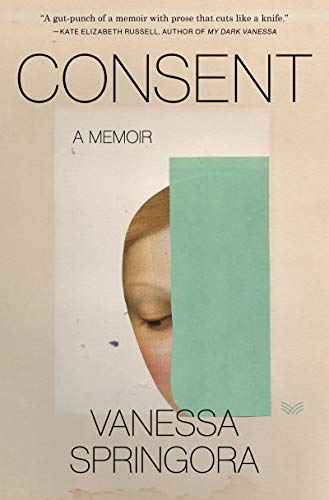Consent: A Memoir

“Even if he is acquitted, Springora has managed to exact some revenge by capturing G, and all of his terrible behavior, forever in these erudite, incriminating pages.”
Growing up in Paris in the 1980s, Vanessa Springora was preyed upon by an acclaimed writer and known pedophile. Her memoir, Consent, is a deeply disturbing, yet crucial reckoning from this brave survivor of egregious child sexual abuse.
Consent opens with a brief account of Springora’s life before her parent’s divorce, including her father’s verbal and physical abuse. Finally, when Springora is five, her mother leaves him and for all intents and purposes, he disappears from his daughter’s life for good.
It’s perhaps no wonder then, that when she is 13, she is attracted to the writer she calls G (outed by the media as the acclaimed French writer, Gabriel Matzneff) because of his “fatherly” eyes.
The “affair,” as many in Parisian society called it at the time, commenced at a dinner party in the St. Germain, under the compliant eye of an artistic society partial to Free Love. So ingrained was the notion of sexual liberty at the time, that even Spingora’s own mother believed it “forbidden to forbid.” Throughout the memoir, she acts as an accomplice, even going so far as to invite the perpetrator over for dinner and allow her daughter to live with him for long stretches of time. Over a period of two years, Springora’s mother never once tried to stop this 50-year-old man from his persistent, sordid seduction of her daughter.
Springora, 14, innocently believes she is G’s sole love interest, but soon discovers he’s pursuing many others behind her back, which leads her to read some of his lurid work, detailing decades' long “relationships” with countless pubescent girls and boys in France, and when abroad in the Philippines.
The year Springora turns 15, G grows less enchanted with her. One night when he takes her along to a television interview and she wears makeup, he asks her if she’s trying to look like a grown-up and reminds her, “I don’t like you like that.”
Slowly over time, it dawns on Springora that her relationship with G is nothing like true love.
As she extracts herself, the adults in her milieu offer no help. In fact, they often intimate that she should be proud to have appealed to a man of G’s stature. Only a rare outlier, a Canadian interviewer, denounced him.
At the end of the memoir, Springora recounts how difficult it was to write Consent, even 30 years later. Currently, she works as the director of the publishing house Julliard. In her inner circle, there are still many fans of G’s work.
She was also afraid to criticize her mother for her involvement, though to her mother’s credit, when Springora showed her the manuscript, all she said was, “Don’t change a thing. This is your story.”
It’s astonishing to read such a lucid, straightforward account of the widespread collusion of Springora’s mother, as well as friends and acquaintances, and the many contemporaries of G, who did nothing to stop a pedophile, who had the audacity to brag about his conquests in widely lauded personal journals.
According to Springora, it’s taken decades to shed her own shame, and realize that she was a child who cannot be blamed for searching for a replacement for her father. As she says in the memoir, “It is not my attraction that needed to be questioned, it is his.”
In a recent New York Times article, Springora said, “My goal actually was to lock him up in a book, to catch him in his own trap, because that’s what he did to me and that’s what he did to many young girls.”
In February 2020, Matzneff was finally charged with promoting the sexual abuse of children.
Even if he is acquitted, Springora has managed to exact some revenge by capturing G, and all of his terrible behavior, forever in these erudite, incriminating pages.